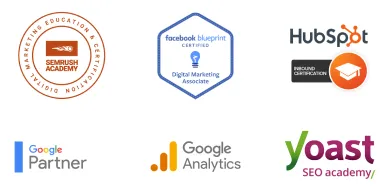TO LEARN IS TO GROW
Learning Center
We do our research and publish our results. Should probably call this the Growing Center.


How to know if my website is fast enough
One of the very first impressions you make on a visitor to your site (and thus your business) is how long is takes for your website to load on their computer or device, or how fast your website is. The bottom line is that website speed matters and it matters for a variety of important reasons, not the least of which include user experience, and ultimately leads and conversions as well.
Think about it from the perspective of the user: loading onto a website that takes just one or two seconds longer than you’re used to can immediately turn you off from a website and even make you use a different one entirely. Did you know that according to data from Kissmetricsblog, 40 percent of website users will abandon a site if it takes more than three seconds for that site to load
So now that you know just how important website speed is for your overall website performance, how can you tell if your business website is running fast enough?
Your server and your website data: 2 main factors contributing to website speed
First, let’s break down the primary factors influencing the speed of your website, starting with the server speed.
—Server speed: the server is what your website runs on and is determined by the location and overall performance of your website host. A website server, or website host, basically stores all the files which make up your website and “serve” them to the internet so that users can then view your site. If your website server is slow for whatever reason, then your website speed will also be slow.
—Website data: your website is made up of files and codes that comprise all the print, media, pictures, etc. on your site. If your website is made up of complicated code and huge images and files, then your site is prone to loading slower.
But since there are so many individual data-related factors contributing to the speed of your website, it’s important to be able to analyze them individually as well to get an accurate measurement of how fast your website is. Let’s now take a look at some of the common signs of a slow website and a few simple tests you can run to determine website speed analytics.
Check Google Page Insights: This valuable tool lets you check the speed of your website and further break down the various improvements you can make to better your website speed performance.
-the Insights tool not only gives your website a performance score out of 100 to give you an idea of how fast your website is loading, but it also makes suggestions on components you can fix (e.g., compression, browser caching, and optimizing images)
How fast does your website load on mobile devices? If your website is compatible with mobile devices (i.e., your website is set to scale for users accessing it through their phones and not just their desktops/laptops), running a test on your phone to see how fast your site loads is generally a strong indicator of website speed.
-the reason for this is because most computers can use what are known as data caches to bypass or disguise slow loading website pages, while a mobile device can’t, thus making it easier for you to get an idea of your true website speed when opening it from your phone.
Additional factors influencing the speed of your website to always keep in mind, include the following:
Network speed: The network speed basically refers to how fast data travels from a device to the internet and can impact how fast your website pages load regardless of the mechanics of the site itself.
Adding content can increase load time: With many hosting servers, adding content to websites can take a toll over time on website speed, since the more data a server needs to load, the longer it usually takes to deliver to the third party.
Increased traffic can slow down speed: While more traffic is always a good thing for your website, if the server experiences traffic flows greater than it is used to (due to a new product release for example), then the consequence can be a slower running website.
In addition to the tools provided by Google to check website speed performance, there are a number of other tools and services available online that will allow you to measure the speed of your website, as well as give you helpful ways of improving the results you receive on those tests.
Built for Growth. Backed by 25 Years of Trust.
For over two decades, LOJO has been a trusted partner to hundreds of businesses just like yours. Whether working directly with owners, managers, teams, or boards of directors, our goal remains the same: to be a reliable and results-driven asset to your business.
Over the years, we’ve carefully built a team of experts—each selected for their unique skills, strengths, and personalities. Our clients choose LOJO because they know we genuinely care about their success.
And after 25 years of helping businesses grow, we’re more committed than ever.


Built for Growth. Backed by 25 Years of Trust.
For over two decades, LOJO has been a trusted partner to hundreds of businesses just like yours. Whether working directly with owners, managers, teams, or boards of directors, our goal remains the same: to be a reliable and results-driven asset to your business.
Over the years, we’ve carefully built a team of experts—each selected for their unique skills, strengths, and personalities. Our clients choose LOJO because they know we genuinely care about their success.
And after 25 years of helping businesses grow, we’re more committed than ever.




Matthew Rogers, President
iProspect Check
After spending several months reviewing multiple proposals from several different companies we engaged LOJO to develop a new website that represents our company effectively. We worked initially with Stephen Platte who helped create the scope of the project. Stephen was knowledgeable and always followed up with me on time and as promised.
He "closed the deal" for LOJO with his professionalism, service orientation and easy going approach. Once we signed the contract we were introduced to Jay Kelly who would be the creative lead for LOJO. This was the most challenging part of the project for my company, as there was no shortage of ideas from our side. Jay managed the project flawlessly, and once we had all agreed to the design, Jay introduced us to Eric.
Eric Lay is one of the founders of LOJO. Eric took the design we had developed and brought it to life. We delivered content as quickly as he requested it. Eric kept the project on task and we responded by exceeding every deadline for content. In turn, once provided, literally not a day went by that Eric didn't add the content and take the next step. In just a few weeks we launched our new website. Eric is a pleasure to work with.
His positive attitude and consultative approach really enhanced the experience and made a big difference for us in the outcome of our project. We would welcome you to visit our website to take a look at the quality work of LOJO. We are very pleased with LOJO and look forward to working with them in the future as we pursue an aggressive SEO strategy."
After spending several months reviewing multiple proposals from several different companies we engaged LOJO to develop a new website that represents our company effectively. We worked initially with Stephen Platte who helped create the scope of the project. Stephen was knowledgeable and always followed up with me on time and as promised.
He "closed the deal" for LOJO with his professionalism, service orientation and easy going approach. Once we signed the contract we were introduced to Jay Kelly who would be the creative lead for LOJO. This was the most challenging part of the project for my company, as there was no shortage of ideas from our side. Jay managed the project flawlessly, and once we had all agreed to the design, Jay introduced us to Eric.
Eric Lay is one of the founders of LOJO. Eric took the design we had developed and brought it to life. We delivered content as quickly as he requested it. Eric kept the project on task and we responded by exceeding every deadline for content. In turn, once provided, literally not a day went by that Eric didn't add the content and take the next step. In just a few weeks we launched our new website. Eric is a pleasure to work with.
His positive attitude and consultative approach really enhanced the experience and made a big difference for us in the outcome of our project. We would welcome you to visit our website to take a look at the quality work of LOJO. We are very pleased with LOJO and look forward to working with them in the future as we pursue an aggressive SEO strategy."

Matthew Rogers, President
iProspect Check
The team at LOJO were wonderful to work with. They are well organized and very patient as we worked through our marketing strategy and developed a well thought out and clear action plan at a reasonable price. We will definitely be back for our future campaign needs."

Jon Crosby, Founder
Dazil

